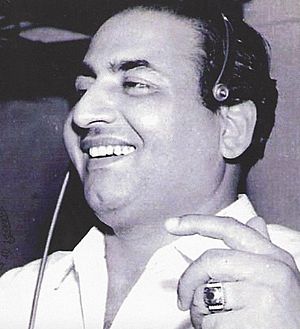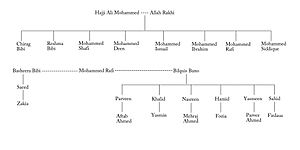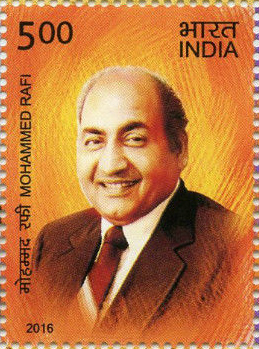Mohammed Rafi facts for kids
Quick facts for kids
Mohammed Rafi
|
|
|---|---|
 |
|
| Born | 24 December 1924 |
| Died | 31 July 1980 (aged 55) |
| Nationality | Indian |
| Occupation |
|
| Years active | 1944–1980 |
| Spouse(s) |
Bashira Bibi
(m. 1938–1942)Biliquis Bano
(m. 1945) |
| Children | 7 |
| Awards |
|
| Honours | Padma Shri (1967) |
| Musical career | |
| Genres | |
| Instruments | Vocals, Harmonium |
| Signature | |
 |
|
Mohammed Rafi (born December 24, 1924 – died July 31, 1980) was a famous Indian playback singer and musician. He is known as one of the greatest and most important singers from the Indian subcontinent. Rafi was amazing because he could sing many different types of songs. His voice could go from fast, energetic tunes to patriotic songs, sad melodies, and very romantic ones. He also sang qawwalis, ghazals, bhajans, and classical songs.
Rafi was special because he could change his voice to match the actor who was singing the song on screen in a movie. He won six Filmfare Awards and one National Film Award. In 1967, the Government of India gave him the Padma Shri award, which is a high honor. Later, in 2001, he was named "Best Singer of the Millennium" by Hero Honda and Stardust magazine. In 2013, a CNN-IBN poll voted him the "Greatest Voice in Hindi Cinema."
He recorded songs for over a thousand Hindi films. He also sang in many Indian languages like Urdu, Punjabi, Konkani, Assamese, Bengali, Marathi, Tamil, and Telugu. Besides Indian languages, he sang in some foreign languages too, such as English, Farsi, and Arabic. He recorded about 7,000 songs in his career.
Contents
Early Life and First Steps in Music
Mohammed Rafi was born into a Punjabi family. He was the second oldest of six brothers. His family came from a village called Kotla Sultan Singh in Punjab, India. When he was a child, Rafi, whose nickname was Pheeko, started singing by copying the chants of a holy man (a fakir) who walked around his village.
In 1935, Rafi's father moved to Lahore. There, he opened a barbershop. Rafi learned classical music from famous teachers like Ustad Abdul Wahid Khan. At 13, he had his first public performance in Lahore, where he sang alongside the legendary K. L. Saigal.
In 1941, Rafi became a playback singer in the Punjabi film Gul Baloch. He sang a duet called "Soniye Nee, Heeriye Nee." In the same year, All India Radio in Lahore invited him to sing for them. He made his Hindi film debut in Gaon Ki Gori in 1945.
Starting His Career in Mumbai
Rafi moved to Bombay (now Mumbai) in 1944. He lived in a small room in a busy area. A poet named Tanvir Naqvi helped him meet film producers. Music director Shyam Sunder gave Rafi his first chance to sing a duet in a Hindi film, "Aji dil ho kaabu mein to dildar ki aisi taisi..." for Gaon Ki Gori.
Rafi's first song with the famous music director Naushad was "Hindustan Ke Hum Hain" in 1944. He also appeared in two movies himself, singing on screen for songs like "Tera Jalwa Jis Ne Dekha" in Laila Majnu (1945). After India was divided in 1947, Rafi chose to stay in India and brought his family to Mumbai.
By 1949, Rafi was singing many solo songs for top music directors like Naushad, Shyam Sunder, and Husnalal Bhagatram. He was influenced by singer G. M. Durrani early in his career, but soon developed his own unique singing style. In 1948, after Mahatma Gandhi's death, Rafi sang the song "Suno Suno Ae Duniyawalon, Bapuji Ki Amar Kahani." He was even invited by India's Prime Minister, Jawaharlal Nehru, to sing at his home and received a silver medal from him.
His Golden Years: Singing in the 1950s and 1960s
Rafi worked with many great music directors during his career. He became very famous in the 1950s and 1960s.
Working with Naushad
Naushad Ali was one of the first music directors Rafi worked with. Their first song together was "Hindustan Ke Hum Hain" in 1944. Their partnership helped Rafi become one of the most important playback singers in Hindi cinema. Songs from the film Baiju Bawra (1952), like "O duniya ke rakhwale," made Rafi even more famous. Rafi sang a total of 149 songs for Naushad.
Working with S. D. Burman
S. D. Burman often chose Rafi to sing for actors like Dev Anand and Guru Dutt. Rafi worked with Burman on 37 films, including popular ones like Pyaasa (1957) and Guide (1965).
Working with Shankar–Jaikishan
Rafi's work with Shankar–Jaikishan was very successful. He sang for them from their first film, Barsaat (1949). Rafi sang many hit songs for actors like Shammi Kapoor and Rajendra Kumar with their music. He won three Filmfare awards for songs composed by Shankar–Jaikishan, including "Bahaaron Phool Barsaao." Rafi sang a huge number of songs for them, 341 in total.
Working with Ravi
Rafi won his first Filmfare Award for the song "Chaudhvin Ka Chand" (1960), composed by Ravi. He also received the National Award for "Baabul Ki Duaen Leti Jaa" from Neel Kamal (1968), also composed by Ravi. Rafi even cried while recording this song, as he later shared in an interview.
Working with Madan Mohan
Madan Mohan loved Rafi's voice. Their first song together was "Hum Ishk Mein Burbaad Hein Burbaad Ruhenge" in 1950. They created many beautiful songs like "Yeh Duniyaa Yeh Mehfil" and "Kur Chale Hum Fida."
Working with O. P. Nayyar
Rafi and O. P. Nayyar made many hit songs in the 1950s and 1960s. Nayyar once said, "If there had been no Mohammed Rafi, there would have been no O. P. Nayyar." They made popular songs for films like Naya Daur (1957) and Kashmir Ki Kali (1964). Songs like "Yeh Chand Sa Roshan Chehera" became very famous.
Working with Laxmikant-Pyarelal
The music duo Laxmikant–Pyarelal (L-P) worked with Rafi a lot. Rafi sang their very first song for the film Parasmani (1963). Rafi and L-P won a Filmfare Award for the song "Chaahoonga Mein Tujhe Saanjh Suvere" from Dosti (1964). Rafi sang the most songs for Laxmikant-Pyarelal, a total of 388. Rafi was known for helping producers financially, sometimes even singing for just one rupee if they couldn't afford more.
Working with Kalyanji Anandji
Kalyanji Anandji composed about 170 songs sung by Rafi. Their work together started with the film Samrat Chandragupta in 1958. They also created songs for films like Haseena Maan Jayegi (1968), which included "Bekhudi Mein Sanam."
Singing with Other Artists
Rafi sang many duets with other famous singers. He sang the most duets with Asha Bhosle and Lata Mangeshkar (female singers), and Manna Dey (male singer). In the song "Humko Tumse Ho Gaya Hai Pyaar" from Amar Akbar Anthony, Rafi sang with Kishore Kumar, Lata Mangeshkar, and Mukesh. This was a rare moment where all these legendary singers sang together in one song.
Rafi also sang for many other music directors throughout his life, including C. Ramchandra, Roshan, and R. D. Burman. He was known for helping smaller projects and often sang for free to support them.
Private Albums and International Songs
Rafi also recorded songs for private albums in different languages. He recorded Hindi songs in English in 1968. He even sang two songs in Mauritian Creole when he visited Mauritius in the late 1960s.
Challenges in the Early 1970s
In the early 1970s, Rafi had a throat infection, which meant he recorded fewer songs for a while. During this time, Kishore Kumar became very popular as a playback singer, especially after the film Aradhana.
Even though he sang less, Rafi still delivered some amazing songs during this period. He worked with music directors like Laxmikant–Pyarelal, Madan Mohan, and R. D. Burman. Some of his hits from this time include "Tum Mujhe Yun Bhula Naa Paoge" (1971), "Yeh Duniya Yeh Mehfil" (1970), and "Gulabi Aankhen" (1970).
Later Years and Final Songs
Rafi made a strong comeback in the mid-1970s. In 1974, he won the Film World magazine Best Singer Award for "Teri Galiyon Mein Na Rakhenge Kadam Aaj Ke Baad."
In 1976, Rafi sang all the songs for actor Rishi Kapoor in the hit film Laila Majnu. He continued to sing many more songs for Rishi Kapoor in films like Hum Kisise Kum Naheen (1977) and Amar Akbar Anthony (1977). In 1977, he won both a Filmfare Award and a National Award for "Kya Hua Tera Wada" from Hum Kisise Kum Naheen.
Rafi sang for many successful films in the late 1970s and early 1980s. His songs were very popular on radio shows. He also performed concerts around the world, including at the Royal Albert Hall in London in 1978 and the Wembley conference centre in 1980.
Death
Mohammed Rafi passed away on July 31, 1980, at 10:25 pm, after a major heart attack. He was 55 years old. The last song he sang was for the movie Aas Paas, just hours before his death.
Rafi was buried at the Juhu Muslim cemetery. His funeral was one of the largest in India, with over 10,000 people attending. The Indian government announced two days of public mourning to honor him. In 2010, his tomb was moved to make space for new burials, but fans still visit the coconut tree nearest to where he was buried to remember him.
Legacy and Influence
Rafi's singing style has influenced many singers who came after him, such as Sonu Nigam and Udit Narayan.
In 2007, a special shrine to Rafi was opened in Birmingham, UK. The Padma Shri Mohammed Rafi Chowk in Mumbai and Pune is named after him. In 2008, the City of Birmingham Symphony Orchestra released a CD called Rafi Resurrected, featuring 16 of his songs.
Many people have asked the Government of India to give Rafi the Bharat Ratna, which is India's highest civilian award. In 2010, a poll by Outlook magazine voted Rafi and Lata Mangeshkar as the most popular playback singers. Rafi's song "Man re, tu kahe na dheer dhare" was voted the No. 1 song.
In 2015, a UK newspaper called Eastern Eye placed Rafi third on their list of "Greatest 20 Bollywood Playback Singers." Many books and documentaries have been made about his life.
Lata Mangeshkar, another famous singer, said that "Rafi bhaiya was not only India's greatest playback singer but also a wonderful person." She added that his voice range was unmatched. Producer-director Manmohan Desai, a big fan of Rafi, said, "If anyone has the voice of god, it is Mohammed Rafi."
Every year, on his birth and death anniversaries, thousands of musical tributes are held on stage, radio, and television. Rafi's popularity is still strong across India and in Indian communities around the world. His popular songs continue to be remixed and recreated today. In 2013, a CNN-IBN survey voted him the greatest voice of Hindi Cinema.
Personal Life
Rafi married twice. His first marriage was to Bashira Bibi, and his second was to Bilquis Bano. He had four sons and three daughters. His hobbies included playing badminton, carrom, and flying kites. He preferred to stay away from industry parties.
According to a book about him, Rafi was a kind, calm, and humble person. He was selfless, devoted, and loved his family. He was known for always helping people he met and contributed to society through his charity work.
Awards and Recognition
See also
 In Spanish: Mohammed Rafi para niños
In Spanish: Mohammed Rafi para niños
- List of songs recorded by Mohammed Rafi
- List of Indian playback singers



